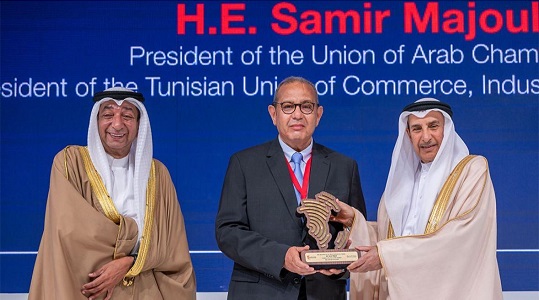The President of the Union of Arab Chambers, President of the Tunisian Union of Industry, Commerce and Handicrafts, Samir Majoul, stressed during a speech at the second session: The vital role of non-governmental organizations in the private sector in economic growth to support governments, in a region that is a global choice for opportunities, within the work of the Bab Al Bahrain Forum 2025 organized by Bahrain Chamber of Commerce and Industry under the patronage of His Royal Highness Crown Prince and Prime Minister Prince Salman bin Hamad Al Khalifa, in the presence of His Excellency the President of the Bahrain Chamber Samir Abdullah Nass, the Secretary General of the Cooperation Council for the Arab States of the Gulf Jassim Mohammed Al-Budaiwi, and the Minister of Transport and Communications of the Kingdom of Bahrain Dr. Shaikh Abdulla bin Ahmed, Minister of Industry and Commerce of the Kingdom of Bahrain Abdulla bin Adel Fakhro and WTO Director-General Ngozi Okonjo, The Director-General of the International Labor Organization , Gilbert Hongbo, that the role of the private sector in economic development is one of the most important axes that deserve deep and careful discussion, especially in light of the current economic challenges faced by many Arab countries, where the sector is represented Private locomotive of economic growth in most countries of the world, plays a pivotal role in financing social and economic infrastructure, and is considered the main source of job creation and improvement of living conditions for communities.
He believed that the state's hegemony over the Arab economy, whether through government companies or direct intervention in vital sectors, represents a major challenge to the development of the private sector, as this economic model, which has been adopted by many Arab countries since independence, has led to a great dependence on the public sector in employment and service provision, while granting broad subsidies and reducing economic risks for citizens. This dominance has resulted in several negative consequences, most notably: weakening entrepreneurship and innovation, monopolizing opportunities and weak competition, declining foreign direct investment, and weak productivity of the private sector. Policies should focus on reducing the direct economic role of the state in favor of regulation and oversight, encouraging public-private partnerships, and reforming legislation to create a competitive and transparent business environment. Strengthening the role of intermediary institutions, such as chambers of commerce, to support the private sector and represent it in policymaking.
The challenges facing our region are multiple and complex, including conflicts, financial pressures, and political divisions. In this context, I believe that Arab governments should prioritize as follows: promoting political and security stability, reforming the business environment, providing financing and supporting SMEs, investing in infrastructure and education, enhancing transparency and fighting corruption, and encouraging regional cooperation.
President Samir Majul noted that artificial intelligence represents an unprecedented opportunity for Arab economies to achieve a quantum leap in productivity and innovation. If properly utilized, this technology can contribute to: improving the efficiency of vital sectors, creating new jobs, and increasing competitiveness by developing innovative products and services that are competitive regionally and globally. There are real risks of underdevelopment if countries do not invest in: digital infrastructure, technical education and training, and bridging the digital divide. The role of chambers of commerce and federations is critical in this transformation by organizing workshops and training courses, encouraging partnerships, representing private sector interests in formulating digital policies, and supporting AI startups and entrepreneurs through dedicated incubation and funding programs.
The President of the Union of Arab Chambers stressed that artificial intelligence is both an opportunity and a challenge, and success depends on the readiness of governments, the private sector, and civil society to adopt this technological revolution comprehensively and fairly.
He stressed that our economic future, despite the geopolitical and financial challenges plaguing our region, lies in unleashing the energies of the private sector, an engine whose role we have long marginalized. Today, we are called upon to forge a new socio-economic contract, based on the principles of transparency, equal opportunities, the promotion of individual initiative, the stimulation of innovation, and the perpetuation of a culture of calculated risk. AI represents a historic opportunity for our economies to take a leading position on the global economic map, but at the same time, it carries with it great risks if we do not make good use and prepare for it optimally. Therefore, we need a comprehensive national strategy aimed at developing digital infrastructure, qualifying human cadres, encouraging research and development, and providing the appropriate legislative and regulatory environment for the prosperity of this promising sector.
He concluded by saying that the chambers of commerce and their federations are called upon today to play a pivotal role in this transitional phase, by supporting small and medium enterprises, encouraging innovation, facilitating access to finance, representing the interests of the private sector before government agencies, contributing to the formulation of economic policies, and actively participating in the implementation of Vision 2030.
Source (Union of Arab Chambers)

